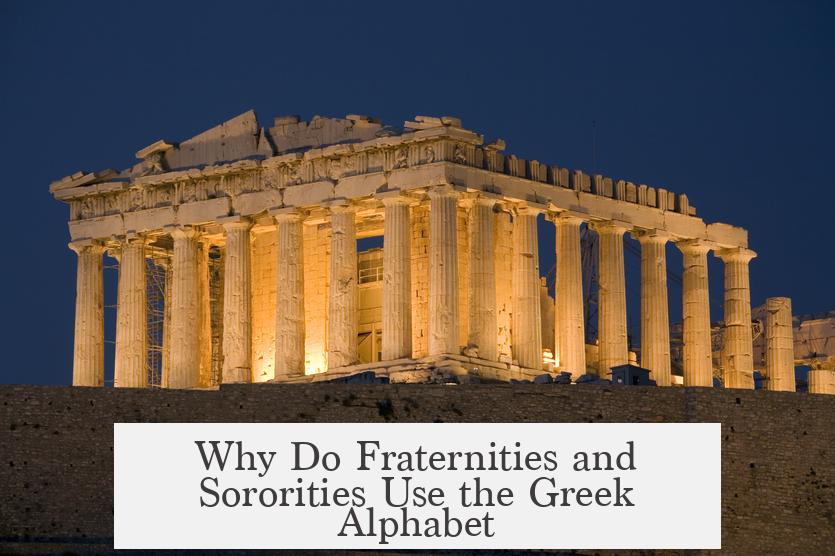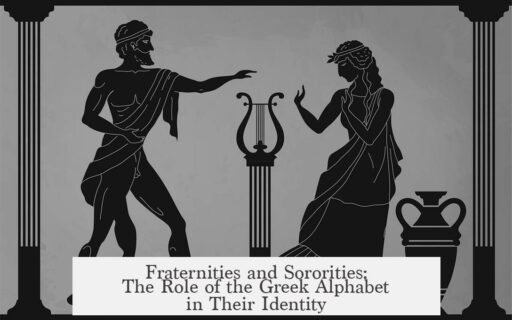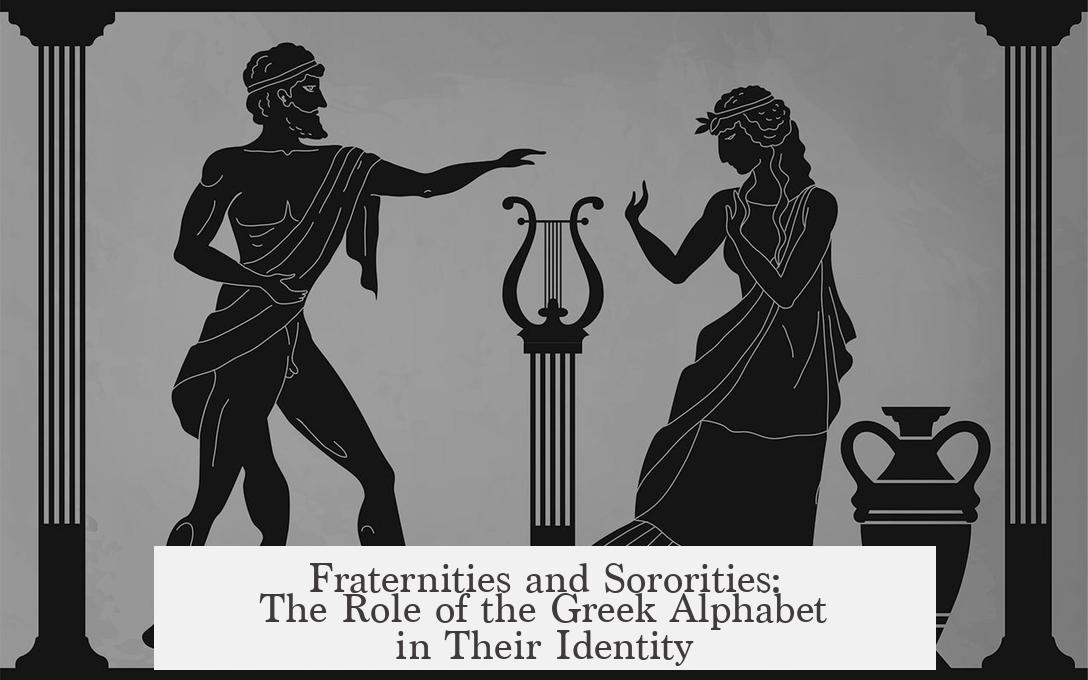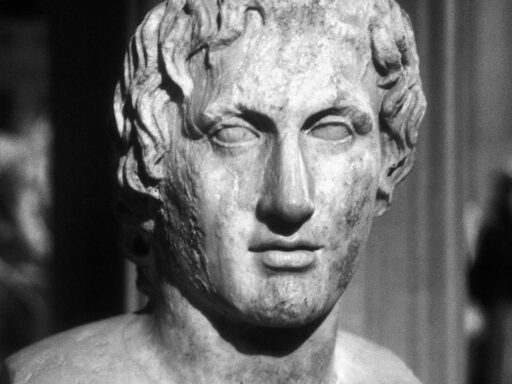Fraternities and sororities use the Greek alphabet because the letters serve as acronyms for Greek words that embody the organizations’ core values and ideals. These values often include charity, study, leadership, and other principles that the groups strive to uphold. Typically, they select two or three Greek letters to create a distinctive yet concise name, avoiding overly long titles.
Greek was chosen over Latin due to Greece’s historical role as the birthplace of modern science, philosophy, literature, and intellectual traditions. This heritage links fraternities and sororities to an esteemed cultural and academic lineage. The Greek language symbolizes intellectualism, reflecting the original purpose of these groups as societies devoted to scholarly discussion and camaraderie.
Early fraternities operated as intellectual societies inspired by classical Greek models. They resembled clubs where like-minded individuals gathered to exchange ideas, akin to ancient Greek philosophical circles. The use of Greek letters continues this tradition and honors this historical and cultural context.
The ongoing use of Greek letters also results from tradition, passed down through generations of members. Although the exact reasons founders initially chose the Greek alphabet remain partly speculative, the practice has become deeply embedded in fraternity and sorority culture. It connects modern organizations to their historical roots.
- Greek letters represent acronyms of Greek words with meaningful ideals.
- Two to three letters balance distinctiveness and brevity.
- Greek language symbolizes intellectual heritage and tradition.
- Fraternities began as intellectual societies modeled after Greek culture.
- Tradition maintains the use of Greek letters today.
Why Do Fraternities and Sororities Use the Greek Alphabet?

Fraternities and sororities use the Greek alphabet because the Greek letters serve as acronyms representing the core ideals of these organizations, such as charity, leadership, and study, and reflect a deliberate connection to ancient Greek intellectual tradition. Let’s dive into why this tradition caught on and why it sticks around, even after centuries.
Think of a fraternity or sorority as more than just a social club. These groups have deep roots in symbolism and values. The choice of Greek letters is no accident. Early members picked letters to stand for Greek words embodying the ideals they wanted to live by.
The Language of Ideals: Greek Letters as Acronyms
When a fraternity or sorority chooses its letters—two or three Greek characters—they’re not just messing about with random alphabets. These letters are acronyms standing for meaningful Greek words. For example, an organization might adopt letters representing “charity,” “study,” and “leadership.” The Greeks had great words for virtues worth aspiring to, and that’s exactly what these groups want to emphasize.
Using just two or three letters strikes the perfect balance. Too few, and you risk blending in; too many, and you end up with a tongue twister—who wants to join “Omega Psi Tau Rho Beta”? The brevity helps with branding and unity. Members wear these sets of letters on pins, shirts, and proud smiles, bonding over shared values encoded in just a couple of Greek characters.
Why Greek and Not Latin?
You might be wondering—Latin, with its own rich history, was the language of the Romans who built a massive empire. So, why not pick Latin letters? The answer lies in the intellectual roots.
Greece is widely considered the birthplace of modern thought. The foundations of science, philosophy, and literature trace back to ancient Greek minds like Aristotle, Plato, and Socrates. Early fraternity founders saw themselves as heirs to this tradition of knowledge and inquiry. Greek, unlike Latin, symbolized the dawn of intellectual discovery rather than empire-building.
This choice connects the organization not only to noble ideals but also to a grand legacy of critical thinking and scholarship. The use of Greek letters nods to this foundation, positioning fraternities and sororities as modern-day forums of learning and leadership.
Historical and Cultural Roots
Back in the early days, fraternities resembled what we might call intellectual clubs or “dead poets societies.” The aim was gathering like-minded thinkers to discuss ideas, arts, and philosophies—much like ancient Greek societies did centuries before.
The early fraternity model was less about wild parties and more about fostering intellectual engagement and moral values. The selection of Greek letters continued this cultural tradition, borrowing the form of ancient Greek scholarly and social groups.
This ancestry is more than a passing fancy—it gives the organizations a distinguished air and connects members to a timeless lineage of knowledge cultivation. When you wear your Greek letters, you’re not just showing off. You’re signaling your part in a centuries-old story of culture and intellect.
Tradition: Why Did It Stick?

While tradition definitely helps explain why Greek letters persist, the original choice by fraternity founders sparks curiosity. What made them select Greek letters in the first place? Was it pure admiration for Greek culture? Or a strategic way to set themselves apart while embracing deep ideals?
Unfortunately, the full motivations often got lost in time. Founders likely wanted a secretive yet meaningful system. Greek letters provided enigmatic initials that outsiders couldn’t easily decipher while packing powerful symbolism for insiders. The blending of tradition, secrecy, and symbolism gave a distinct identity to each fraternity or sorority.
Today, while motivations may be less mysterious, the tradition is taken seriously. Organizations honor their founders’ choices by continuing to use Greek letters, preserving the link to history and shared values. This continuity reassures members that they belong to something larger than themselves, a network united by more than friendship alone.
Practical Takeaways for Curious Minds
- When joining a fraternity or sorority, ask: What do our Greek letters actually stand for? This can uncover the values your group cherishes.
- Consider the tradition: Wearing Greek letters is a nod to a long intellectual heritage. It’s more than decoration—it’s a badge of values.
- Respect the origins: These groups weren’t always about parties. They started as hubs of learning and thoughtful conversation.
So next time you see a group decked out in their Greek letters, remember: there’s a story packed into those symbols. It’s a story about ideals, about honoring roots in ancient Greece’s intellectual cradle, and about belonging to a community bound by shared virtues and history.
“Behind every set of Greek letters is a history of ideals, intellectualism, and cultural identity that stretches back more than two millennia.”
If you want to dig deeper, consider researching specific fraternities’ or sororities’ Greek letter meanings. Many public records and archives offer insights on how those acronyms relate to noble values and origins. It’s both enlightening and a reminder that tradition is never just tradition—it is legacy.
Why do fraternities and sororities use Greek letters as acronyms?
Greek letters stand for Greek words that reflect the organization’s values. These words often express ideals like charity, leadership, and study. Using letters creates a shorthand for these important principles.
Why did fraternities choose Greek letters instead of Latin?
Greek was chosen because Greece is seen as the birthplace of modern science and philosophy. The Greek legacy symbolizes intellectual roots, which aligns with the scholarly aims of fraternities.
How does the use of Greek letters connect to historical traditions?
Early fraternities were modeled after Greek intellectual societies. Using Greek letters links these groups to ancient cultural and educational traditions.
Why do fraternities typically use two or three Greek letters?
Two or three letters make the name distinct but still brief. This balance helps groups stand out without long or complicated names.
Is there a known reason why founders chose Greek letters originally?
The exact original reasons remain unclear. Tradition explains the continued use, but more research is needed to understand the founders’ initial motivations.




